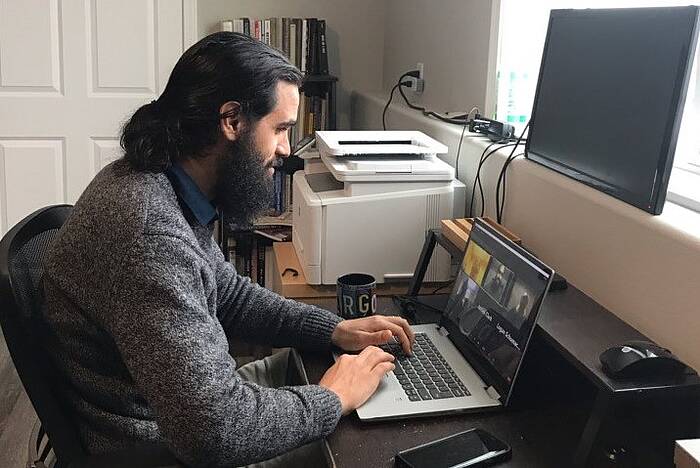Challey Spotlight: James Caton, Ph.D.
Assistant Professor of Economics
James Catonis an assistant professor of economics in the NDSU Center for the Study of Public Choice and Private Enterprise and a scholar of the Challey Institute for Global Innovation and Growth. As a macroeconomist, he specializes in research related to entrepreneurship, computational economics, market process theory, and monetary economics. He is a regular contributor to the American Institute for Economic Research’s Sound Money Project, which conducts research and promotes awareness about monetary stability and financial privacy. Jim received his Ph.D. in economics from George Mason University in 2017. He lives in Fargo with his wife, Ingrid, and two children.
Research and outreach highlights:
Click here for a video from Dr. James Caton
You are teaching three new courses at NDSU that you helped create: Computational Economics, Economics of Entrepreneurship, and a workshop for the New Institutional Social Science graduate certificate. How are these classes helping to prepare students for the 21st century economy?
I give students tools that prepare them for the job market or prepare them for graduate school, and I would say equally prepare them. For example, if you take my computational economics course, you should have a line on your resume that says you can program in Python, you can analyze economic data through statistics, and you can build data visualizations. If you apply to grad schools, you should be able to note that you know how to engage in self-driven research. In all of my classes, I explicitly advertise that when you’re finished, you’re going to have marketable skills for whatever it is that you want to do.
Read about James Caton’s teaching philosophy.
Speaking of data visualizations, you decided to launch a COVID-19 data dashboard last spring to track the spread of the pandemic and the unemployment effects. Why was this important to you?
I think there’s a few reasons this was important. As far as my professional activity goes, I want to be a good example to my students. I think that the more creative I can be and the more useful outputs that I create, then the more students will envision themselves doing something to help their communities. At the time, and this has changed since then, but at the time, county-level data and state-level data was difficult to find for COVID-19. So, as we were trying to figure out what was going on in North Dakota, it became important to me to create a data visualization application that allowed users to look at the county level. Once that was created, it became obvious that we should have a relevant economic indicator that helps us understand the impacts of COVID-19, and so I created a second app to compare unemployment rates relative to February 2020.
Check out the data apps created by James Caton.
You have a diverse research portfolio. What are you currently working on?
I have a few projects in progress, but I’ll mention three that I think identify the diversity of what I’m working on right now. First, I’m continuing to develop the agent-based model that I’ve been working on since graduate school. In my model, the agents learn from each other and they learn somewhat randomly, so they try new things, and then they trade in the marketplace and other agents will copy those agents that seem to perform better. So, my economy consists of machine learning, essentially robots that learn from each other. Second, I’m looking at the role of ideology and monetary policy in the Great Depression and the Great Recession. In other words, how does a particular ideology, with regard to belief about the ability of markets to efficiently allocate resources, lead to different policies at the Federal Reserve? Lastly, I’m looking at the significance of discourse in allowing a pluralistic society to function and govern itself. In particular, this work looks at England in the 17th and 18th centuries, where we see that the move toward a pluralistic society led to increased autonomy and ultimately translated to increased economic activity.
You have led six reading groups at NDSU and are set to lead your seventh, "Entrepreneurship: From Ancient Mesopotamia to Modern Times" this fall. What insights can you share about the program?
When we started the program in 2017, I wasn’t expecting to see so much student development. Now we see the results. Students are noticeably transformed by the end of the reading group. The reading group provides an important opportunity for students to contextualize their own studies. We have a lot of students from the business school, from agriculture programs, from the engineering school – we get students from all over campus – and I have noticed that they leave the reading group with a sense of awe. They realize how their pursuit is ultimately going to enrich the world and is going to be enriched by the world. My favorite thing is to see students have the “a-ha” moment. Often times you see that suddenly everything makes sense to the student and, when that happens, it’s impossible for them to hide because they are excited.
How does philanthropic support impact your work?
Well, I don’t think we could do the work without it. Philanthropy helps energize our work. I think maybe donors don’t realize everything they help support. I’m somebody who has benefitted from philanthropic support, and I’m somebody who is working very hard to provide students with technical skills and research skills that are going to benefit them. That’s priority number one. I’m working as hard as I can to prepare students to give back to the community, no matter what venue they choose to do so in. Through philanthropy, the donors are also investing in the students I teach and, ideally, in the work they will do in the Fargo-Moorhead region.



